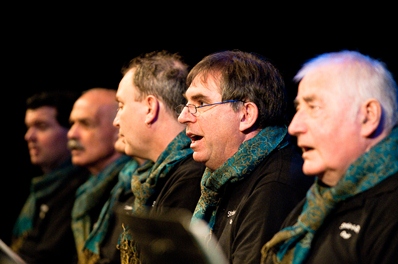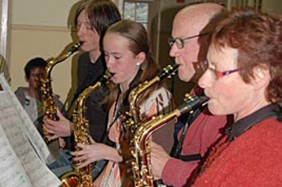
Stroke a Chord Choir
Music in Communities Awards Finalist: 2012
Location: Ringwood East (Melbourne), VIC
PREVIOUS | NEXT | AWARDS HOME
 This choir from suburban Melbourne is for stroke survivors with aphasia (little or no speech). The choir consists of people aged between 40 and 84 with most members in their late 60’s early 70’s. The choir members have little or no speech but can sing, a neurological phenomenon due to speech and music being processed in different areas of the brain.
This choir from suburban Melbourne is for stroke survivors with aphasia (little or no speech). The choir consists of people aged between 40 and 84 with most members in their late 60’s early 70’s. The choir members have little or no speech but can sing, a neurological phenomenon due to speech and music being processed in different areas of the brain.
Judges' comments:
Aphasia is a most frustrating condition. This project allows people to use their voice in a community setting, and to have a voice. The choir members are seen for their ability, not disability, and can participate in creative activity when they aren’t able to participate in many others. Through music, people are given confidence in their daily lives. A significant aspect of this project is that it feeds into medical research which leads to sustainability and learning for others. We need the research such as this to normalise this type of activity so that further projects of this kind will be supported and funded.
One member, who was a performing arts coordinator at a large secondary school before his stroke, now accompanies the choir with one hand (the other is paralysed), re-engaging with an activity that has been central to his identity. The members of the choir participate in running the group and selecting its repertoire.
The choir is run by a Registered Music Therapist, in partnership with the Croydon stroke support group, a Metroaccess social inclusion worker from Maroondah Council and a community based Yooralla Speech Pathologist.
For more information see strokeachord.com
What do we know about music for stroke survivors?
Early research exploring the impact of participation of stroke survivors in music activities observed that music enhances general mobility, social interaction and can improve emotional stability (Cross, 1984). A randomised control study with stroke survivors found that music therapy decreased depression and anxiety (Purdie, Hamilton, & Baldwin, 1997) and more recent studies have indicated a positive effect for music therapy on mood for people following stroke (Magee & Davidson, 2002; Nayak, Wheeler, Shiflett, & Agostinelli, 2000). Participation in musical activities such as singing in choirs provides an opportunity to meet with and work with like-minded people to jointly work on and produce a meaningful performance (Bailey & Davidson, 2005). The act of singing or listening to music also has both direct benefits on mood through providing a pleasurable experience for participants, but also indirect benefits through lowering levels of stress hormones in the body that indirectly lead to improvements in mood but also other areas such as the immune system (Kreutz, Bongard, Rohrmann, Hodapp, & Grebe, 2004).



















